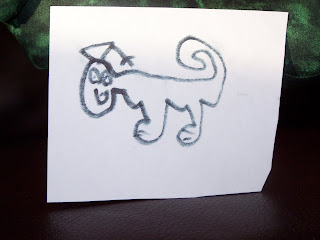

Grandson, Dallin, redeemed a 3 1/2-year-old coupon to have me make this chameleon for his school teacher for Christmas. He loves to draw chameleons and drew a picture for me to use to make a pattern. I think it turned out really well!

The Legend of the Magic Christmas Cone
Long ago in a land far away there lived a little boy named Granther. Granther was a good boy deep down inside, but on the outside, he was not so good because he loved to hide in the bushes beside the road and throw sticks and stones at the people who passed by on their way into town. Sometimes people got angry and chased after him, but instead of making him afraid to do it anymore, he just learned how to hide better. One day, just two weeks before Christmas, a very angry man pounded on Granther’s cottage door. “This has got to stop!” he yelled at Granther’s mother, showing her a handful of rocks. He shook his fist at Granther as he stormed out the door. Granther’s mother started to cry, she had tried everything to get him to stop, all to no avail. “Give me your rocks,” she said sadly, “I know you are a good boy deep inside; one day you will understand.” Granther emptied out his pockets into his mother’s hands—all but one smooth stone the size of a robin’s egg. He slipped it into the manger of the nativity scene for safe-keeping, thinking he could come back and get it later.
That night Granther had a very unusual dream. He dreamed he was in a stable. It was Christmas night and he saw the baby Jesus in the manger, with his mother and Joseph there. He saw the shepherds and all the animals. It was a beautiful sight. Suddenly a rock fell on baby Jesus, then another and another. The baby started to cry. Mary and Joseph tried to protect the baby, but the rocks kept coming, landing harder and faster. Granther looked around in despair; where were they coming from? Who was doing this? Why, why, why? He noticed someone in the shadows and raced to stop the evil-doer. Granther knocked him down and wrestled him until a stream of moonlight fell across them and he stopped cold, for he saw that he was wrestling himself! Tears began flowing freely, tears of compassion for the baby Jesus, tears of anger at what had been done, and also tears of sorrow to realize who had done it.
He woke with a start to find his heart racing and his pillow wet with his tears. It was before dawn but he raced to the manger to retrieve his rock and throw it one last time, far into the forest. He knelt before the manger and said a prayer, “Please forgive me, I will never throw sticks and stones at people again. I will try to be kind and loving, and treat others as I would wish for the Christ child.” He searched in the tiny manger, but instead of his rock, he found a jewel.
Some say that that the miracle came from Elfin magic. But I believe that it was a miracle of love, the love for a Christ child, born of a sincere desire to replace sticks and stones with kindness.


“So” is a lovely word that can be used properly in many ways: I love you so much! I’ll see you at 10:00 or so. I’ll go to bed early so (that) I can get up early tomorrow. However, the word “so” has come to be used as an oral punctuation mark, an oral period at the end of a sentence: “We got back from our trip to the Bahamas last night and it was very hard to get back in our routine this morning, so…” Whatever the sentence, when it ends with “so” I want to scream “So WHAT?” Using that word at the end of the sentence implies that the speaker isn’t finished, it begs the listener not to tune out yet, there’s going to be more. It was hard to get back in the routine so that’s why you’re late today? So that’s why you want me to take over your duties this morning? So you want to tell me about your vacation? WHAT? “So” isn’t the only oral punctuation mark; the word “or” functions as a question mark at the end of a sentence: “Did you want to ride with me, or?” Or WHAT? Or ride with someone else? Or take my own car? Or stay home? If you’re giving me a choice here, then by all means tell me the choices. When these words are used as punctuation, it constitutes very sloppy English and it is becoming rampant in our society, driving me (and other English connoisseurs) crazy…so
Please don’t use those lovely words that horrid way!
(Hah! You thought I was going to do it!)
As school starts again I am reminded of the many wonderful teachers I had over the years. Although not a favorite teacher, Mrs. Boone is one of my most appreciated. She was my English teacher my senior year of high school (now forty years ago, ouch!). The one word I choose to describe her is DELIBERATE. Everything about her was deliberate, everything she wore, every movement and gesture, every glance, every word she spoke. She demanded deliberateness in her students, as well, which at times was very frustrating, but something that I have learned to appreciate. Not only did she scrutinize our written words, but she also insisted we speak English properly. She did not allow slang phrases of the day in her class room. Teenagers are known for slang and it was a difficult thing for us to break our language habits for one hour a day. But I am so grateful she insisted, for those good habits she created in me have elevated my conversational speech, serving me well throughout my life. One drawback is that I have become somewhat neurotic about the English language and its usage, both written and spoken. My list of pet peeves about English only grows as its usage declines (thank you texting). And so I shall share those peeves over the next few weeks, possibly making you neurotic about them, too, bwahaha!
Mrs. Boone retired the year she taught my English class. She is probably gone now. But she can enjoy her heavenly reward, knowing that she made me an English monster.
